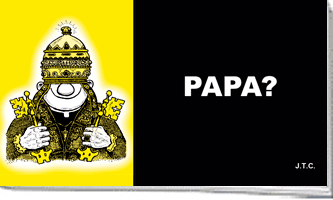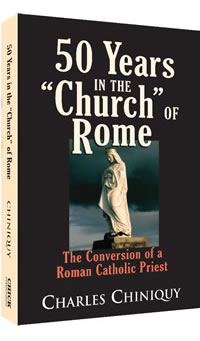Purgatory is Really Hell
- Issue Date: January/February 2009
Halloween has become a big, commercial event in America but for Roman Catholics, another kind of commerce follows immediately. Technically, October 31 is the "hallowed evening" before All Saints Day, November 1, which is the day before All Souls Day, November 2.
For Catholics, All Saints Day is a feast day celebrating those who have, somehow, made it all the way to heaven. In Rome`s book, you can`t become a saint until you get to heaven. But All Souls Day is different. It is set aside to "pray" for those "souls" who are not yet saints in heaven but are parked in a "prison of fire" part way there called "purgatory." It also serves to remind their family members to pay up for their escape.
Purgatory`s purpose is to "burn away" the "stains of sins" that prevent one from full acceptance into heaven. Rome ignores the Biblical teaching that Christ`s death is full payment for our sins. Instead, the popes picked up the pagan notion that we, somehow, must be punished ourselves to atone for our sins. The St. Peter`s Catechism states: "All the souls in purgatory will go to Heaven when they have atoned for their sin."
The poor Roman Catholic can never be sure of heaven. First he must be born to faithful parents. At birth, baptism is required. Then his conscience must be "formed" by the catechism that teaches such unbiblical ideas as prayer to the Virgin Mary goddess, "receiving Jesus," the wafer god, at Mass, and confessing sins to God`s stand-in, the priest. Before death, "last rites" must be performed to make sure "mortal" (big) sins are forgiven. "Venial" (little) sins may still exist and need to be taken care of by "temporal punishment" such as indulgences, alms giving or other acts of "penance." Any left over are "burned away" in purgatory.
Incidentally, even the popes do not get a pass. One missionary to Italy recalls that when a pope died, there were posters displayed around town asking the faithful to pray that his stay in purgatory be shortened.
How sad that, after a life of jumping through the pope`s hoops, the precious Roman Catholic ends up in the fire and thinks there is a way out. Even more diabolical is what`s happening to his family and friends after he is gone —more jumping through hoops.
They are told that somehow their good works, paying for masses, buying indulgences or other good "intentions" will shorten his stay in purgatory. Not only does this "bind the faithful Roman Catholics to the church," but it empties their pockets as well. It`s an open—ended cash machine because no way has been devised to tell when their loved one escapes the flames.
Charles Chiniquy, in his book 50 Years in the "Church" of Rome, describes how, when his father died, the local priest demanded payment for Masses to speed him out of purgatory. His widowed mother had no money to give, so the priest demanded she give him the only cow they had. Then the priest led the cow away, eliminating one of the main sources of food for her orphaned children.
Rome claims to accept the simple liberty of Christ`s atoning work but then straps its people down with contradictory "traditions." Like the Pharisees, they have "made the commandment of God of none effect" with these traditions. (See Matthew 15:6.)
Jack Chick says that the new tract, Papa?, must get into the hands of these precious people to show them the danger to their eternal destiny. We need to love them enough to show them that Jesus paid the full price! They need only trust Him and they will "have everlasting life." (John 3:16)
When you hand out Papa? consider also giving a copy of Who Is He? Most Roman Catholics are not that familiar with Jesus since the Virgin Mary goddess is the main focus of their worship.
- See more articles on related topics:
- Catholicism
Other Articles from January/February 2009:
More on Catholicism:
Products of Interest:

Papa
Anthony must choose: will he believe the pope and burn in purgatory, or believe in Jesus and go to heaven?
Who is He?
The world is confused about who Jesus is. It's a mistake they can't afford to make.-

50 Years in the Church of Rome
368 pages
This classic work shows how this priest began to question Catholic teachings until he became saved, and led his entire parish to salvation.



